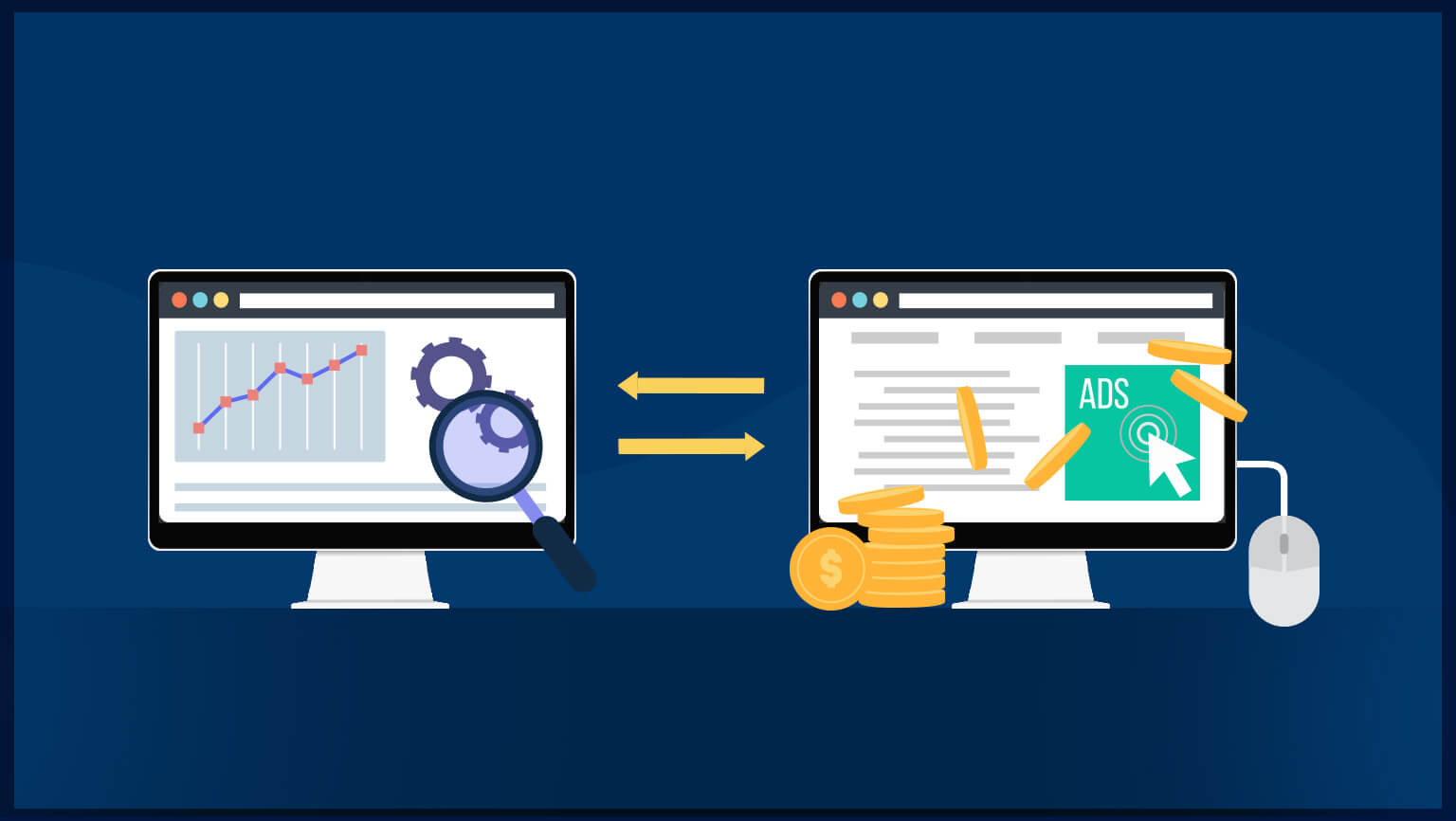If you’re trying to decide between investing in SEO or PPC, understand from the get-go that both have their advantages and disadvantages. There’s not always a simple answer to this question when it comes to increasing leads through either technique; different companies have different needs.
Depending on your current situation, what your goals are, and what the marketplace looks like, you might benefit from one of the techniques more than the other right now. Generally, SEO is advisable for long-term benefits and consistent web traffic. PPC is more oriented around quick boosts in traffic and transactions.
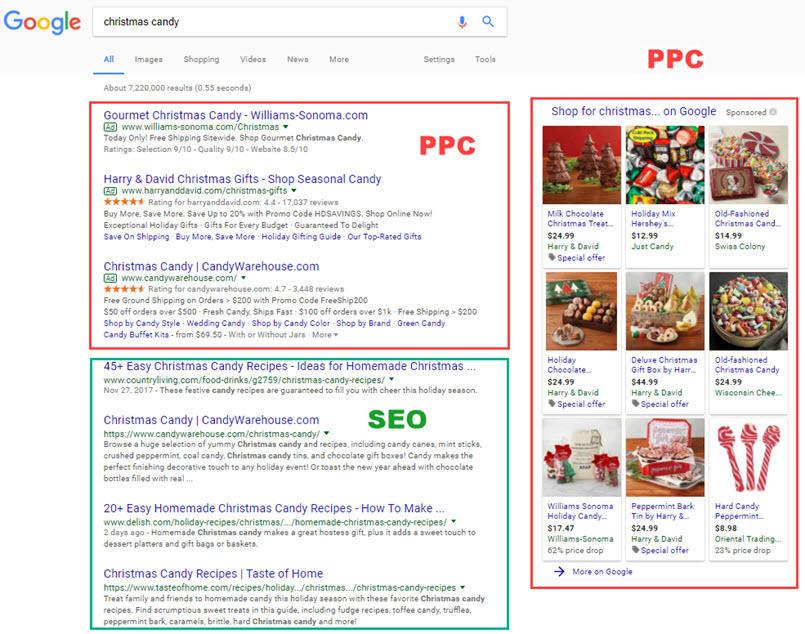
Let’s dive into the key differences between SEO and PPC, as well as situations in which both are more or less impactful.
What Is SEO?
The primary goal of SEO, or “search engine optimization,” is to organically (unpaid) build awareness and visibility on the search engines. By targeting the right keywords and links, SEO can put you in front of many potential customers and help people discover your business naturally online.
One major incentive of investing in SEO is that it increases your online “street cred” significantly. People want to be able to find your website organically and immediately trust that it’s professional. The primary goal of SEO is to boost your website traffic and give your company authority on certain topics. The higher up your website appears on relevant searches, the more credibility it has in the eyes of Google.
SEO experts focus on “keyword volume” to determine which specific terms or phrases need to be targeted.
Generally, you’ll want to focus on specific phrases rather than broad, general ones. For example, if you’re improving your SEO as an exotic pet store owner, you’ll want to target phrases like “exotic pets vet” or “exotic animals as pets pros and cons” with a search volume under 100. These are much easier to rank highly for than a phrase like “legal exotic pets,” which has a search volume of over 9,000.
A big setback that comes with SEO is the cost. It’s certainly not cheap to hire a great agency to get the job done right, and although you can make strides toward SEO improvement on your own, there’s a lot to be said for turning to the experts.
However, it does typically have a fairly high ROI, especially in comparison to some other marketing avenues. Blue Corona states that 59 percent of B2B marketers say SEO has the biggest impact on their lead generation goals, and 57 percent of B2B marketers claimed that SEO generates more leads than any other marketing initiative.
The big thing to remember about SEO is that it’s an ongoing, never-ending process. You can’t just pour money into SEO for one year and then never think about it again. Things are always changing with search engines and your competitors, which means improving your organic visibility online is an ongoing battle.
What Is PPC?
You know when you Google something and find an “Ad” at the top of the page featuring a relevant website or product? That’s PPC, or Pay Per Click.
Paid search appears above the organic results and ensures that searchers see the advertisement right away. They might not click on it, but they still saw the business name and became aware of its online presence.
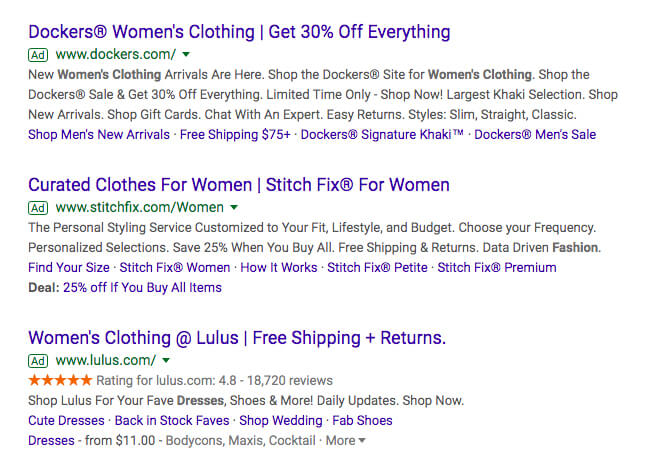
Image Source: Google
At its core, paid search is all about targeted advertising. It generally works well for making conversions and increasing sales. Many people like this aspect because it gives them control over who they market to, what the marketing message says, the keywords they rank for, and how customers can contact them.
SEO involves a long, highly strategic approach to appear at the top of the Google results pages, whereas PPC places you there immediately. Moreover, the website clicks you get from organic SEO are free, whereas PPC, as the name implies, costs money every time someone clicks.
PPC campaigns are very easy to initiate. Within a matter of days, you could have powerful ads up and running at the top of important Google searches. It’s all about picking the keywords you want to target with your ad.
PPC uses a “cost per click” strategy, which means picking the keywords you want to target is very important.
For example, let’s say you want people to click on an ad that has something to do with dog grooming. The phrase “dog grooming Indianapolis” has a CPC of $3.06, but “pet grooming Indianapolis” could be cheaper (around $2.66 CPC). You’ll need to put a great deal of energy into deciding what kind of PPC keyword strategy you want to use and what it will cost you, then weigh it against the potential revenue.
One thing to keep in mind is that 70 to 80 percent of search engine users are only focusing on organic search results. They might not be interested in looking at advertisements, and although they will notice your brand or product at the top of the page, they might not click. Or, they might click on your ad, but not buy anything, therefore costing you the CPC price.
The most important thing to keep in mind here is to target keywords with transactional intent. Here are a handful of examples:
- Buy ___
- Pricing ___
- Order ___
- Discount ___
- Coupon ___
- Cheap ___
Unfortunately, the transactional keywords you’re interested in might be pretty costly to target. As long as you’re careful about which words you pick and how you set up your PPC campaign, you should be able to keep the prices relatively low, but it just depends. The smaller your targeted location is, the less you’ll spend on targeted advertising.
Assessing Your Goals
Now that you know a little bit about what differentiates SEO from PPC, let’s talk about the goals of each technique and how they can align with your ambitions for your company.
What is the goal of SEO?
At the end of the day, the ultimate goal of SEO is to make your site usable and findable via search engines. When people search online, you want them to find your page without having to dig through hundreds of results. You want them to see that your company and its website are trustworthy, popular, and easily accessible.
A search engine’s purpose is to provide the best answer to a searcher’s query, so an SEO strategy is often geared towards more informational and navigational (towards the top of the sales funnel) keywords, rather than transactional. These keywords come from searches in which people want to learn – think about tips, how to, or best ___ in ___ or top rated ___.
The searcher might not know what product they’re looking for specifically, but they want to find knowledgeable content that can steer them in the right direction.
As a marketing agency in Indianapolis trying to rank well organically, we’d target phrases like “the best marketing agency Indianapolis” or “recommended marketing agencies in Indianapolis.” We might even try to register with “compare digital marketing agencies” or something similar to really appeal to people doing their research.
What is the goal of PPC?
When you start a PPC campaign, there’s a more specific kind of goal in mind. A pay-per-click marketing campaign helps you boost revenue by specifically targeting certain users in certain scenarios. You may want to highlight a product or showcase your website at the optimal time, and users will see that and recognize it as an advertisement.
If SEO uses informational and navigational (at the top half of the funnel) keywords, then PPC is typically geared towards the flip side more focused navigational and transactional words/phrases. These keywords indicate that a searcher is ready and looking to buy a product or service.
Returning to the example of a marketing agency in Indianapolis, we’d want to target navigational keywords such as digital marketing agency Indianapolis.

While the CPC is definitely high for this, the potential revenue from a single campaign would make these clicks worthwhile.
A PPC campaign is about getting people to take the leap and convert, and the targeted keywords should reflect that.
How to Strike a Balance Between SEO and PPC
At the end of the day, both SEO and PPC have powerful impacts on your revenue and your site’s popularity – they just come from different parts of the sales funnel. One brings people to your site organically while the other forces its way to the forefront of people’s search results. With the help of both, you could be looking at a healthy ROI and a large jump in viewership.
SEO is extremely important for local businesses that want to rank in Google My Business and location-based search results . Additionally, it’s a great way to keep visitors coming without paying for each and every click. Once your website is visible, all of the users that stop by are free.
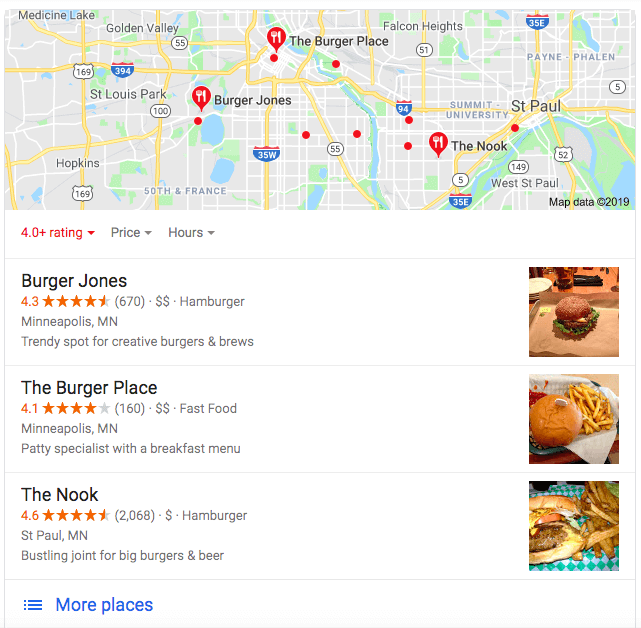
If your SEO is low, and you want to rank for searches like top burger joints in Minneapolis, you’ll certainly struggle. To rank locally, you need to have a strong, credible online presence that people can easily confirm. Local businesses that don’t appear organically on Google will struggle immensely in comparison to their competitors.
On the flip side, let’s say you launched a new product and you need people to start buying now. In that case, investing heavily in PPC might benefit you more than SEO. You don’t want customers to just stumble across your site – you want to bring them there immediately and pay for instant engagement and conversions.
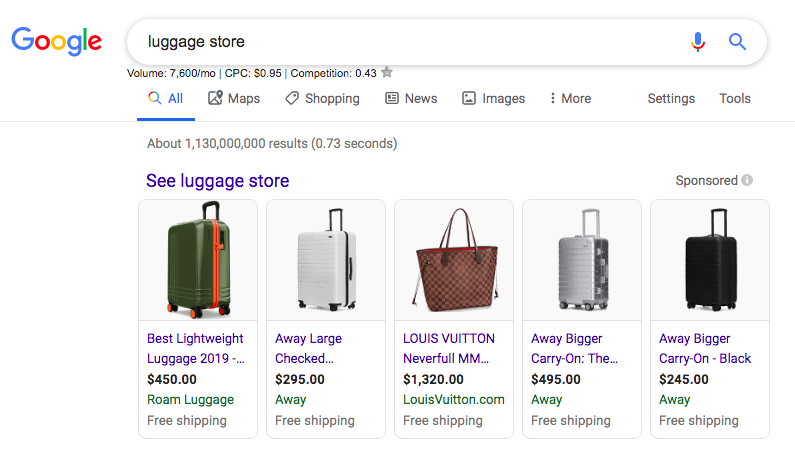
Look at the example above. This is a perfect instance in which paid advertising is likely worth buying. The luggage is worth hundreds of dollars in revenue, but the CPC is relatively cheap, leaving the seller with a solid ROI if people can easily find their products.
PPC can also be very important if your competitors are constantly running ads. In order to compete with other businesses, you’ll likely need to launch ads that appear in the same locations and spaces as theirs do.
In terms of striking a balance, you’ll need to decide where your business’ weaknesses lie.
Are you not obtaining enough organic traffic? Pour some resources into SEO.
Do you need a certain product or service to get more attention from searchers? Consider PPC.
Looking to highlight an in-depth informational piece for brand awareness? Promote it with SEO, not paid ads at the top of a Google search.
Want to use an eBook to gather leads? Consider promoting it with PPC.
You don’t need to just choose one technique – take into account the goals and whether the potential ROI is worthy of using the tactic.
In Conclusion
This article can’t tell you if you should invest in SEO, PPC, or both right now. What it can tell you is how both methods work and instances in which they are the most beneficial. Since SEO and PPC are both not permanent services, you’ll likely need to use both in the future in order to reap their full benefits.
Look at your business’s situation right now to determine what it really needs online.
- Does it need more organic brand awareness?
- More targeted advertising to boost leads/revenue?
- Both?
Once you can decide where its needs are the highest, you’ll be able to decide if SEO or PPC is more important. If you have any questions related to SEO or PPC, please do not hesitate to reach out to the team at Ayokay!
Jack Shepler is a Marketing and Search Engine Optimization expert. He founded Ayokay, award-winning marketing, and web design firm in Indianapolis, Indiana that has built brands, increased sales for businesses, and helped nonprofit organizations fulfill their missions since 2011. He uses his decades of experience to educate through the Ayokay blog and through public speaking. You can follow him on LinkedIn.

